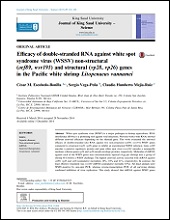Mostrar el registro sencillo del ítem
Efficacy of double-stranded RNA against white spot syndrome virus (WSSV) non-structural (orf89, wsv191) and structural (vp28, vp26) genes in the Pacific white shrimp Litopenaeus vannamei
| dc.contributor.author | ESCOBEDO BONILLA, CESAR MARCIAL | |
| dc.contributor.author | Vega Peña, Sergio | |
| dc.contributor.author | MEJIA RUIZ, CLAUDIO HUMBERTO | |
| dc.date.issued | 2015 | |
| dc.identifier.issn | ISSN: 1018-3647 | |
| dc.identifier.other | DOI: 10.1016/j.jksus.2014.11.004 | |
| dc.identifier.uri | http://dspace.cibnor.mx:8080/handle/123456789/2965 | |
| dc.identifier.uri | https://www.sciencedirect.com/science/article/pii/S1018364714000834 | |
| dc.format | es | |
| dc.language.iso | eng | es |
| dc.publisher | King Saud University | es |
| dc.rights | Acceso abierto | es |
| dc.source | Journal of King Saud University – Science | |
| dc.subject | WSSV, Aquatic diseases, Non-structural genes, dsRNA, Antiviral therapeutics, Litopenaeus vannamei | es |
| dc.subject.classification | GENÉTICA ANIMAL | es |
| dc.title | Efficacy of double-stranded RNA against white spot syndrome virus (WSSV) non-structural (orf89, wsv191) and structural (vp28, vp26) genes in the Pacific white shrimp Litopenaeus vannamei | es |
| dc.type | article | es |
| dc.description.abstracten | "White spot syndrome virus (WSSV) is a major pathogen in shrimp aquaculture. RNA interference (RNAi) is a promising tool against viral infections. Previous works with RNAi showed different antiviral efficacies depending on the silenced gene. This work evaluated the antiviral efficacy of double-stranded (ds) RNA against two non-structural (orf89, wsv191) WSSV genes compared to structural (vp26, vp28) genes to inhibit an experimental WSSV infection. Gene orf89 encodes a putative regulatory protein and gene white spot virus (wsv) 191 encodes a nonspecific nuclease; whereas genes vp26 and vp28 encode envelope proteins, respectively. Molecules of dsRNA against each of the WSSV genes were intramuscularly injected (4 lg per shrimp) into a group of shrimp 48 h before a WSSV challenge. The highest antiviral activity occurred with dsRNA against orf89, vp28 and vp26 (cumulative mortalities 10%, 10% and 21%, respectively). In contrast, the least effective treatment was wsv191 dsRNA (cumulative mortality 83%). All dead animals were WSSV-positive by one-step PCR, whereas reverse-transcription PCR of all surviving shrimp confirmed inhibition of virus replication. This study showed that dsRNA against WSSV genes orf89, vp28 and vp26 were highly effective to inhibit virus replication and suggest an essential role in WSSV infection. Non-structural WSSV genes such as orf89 can be used as novel targets to design therapeutic RNAi molecules against WSSV infection." | es |

